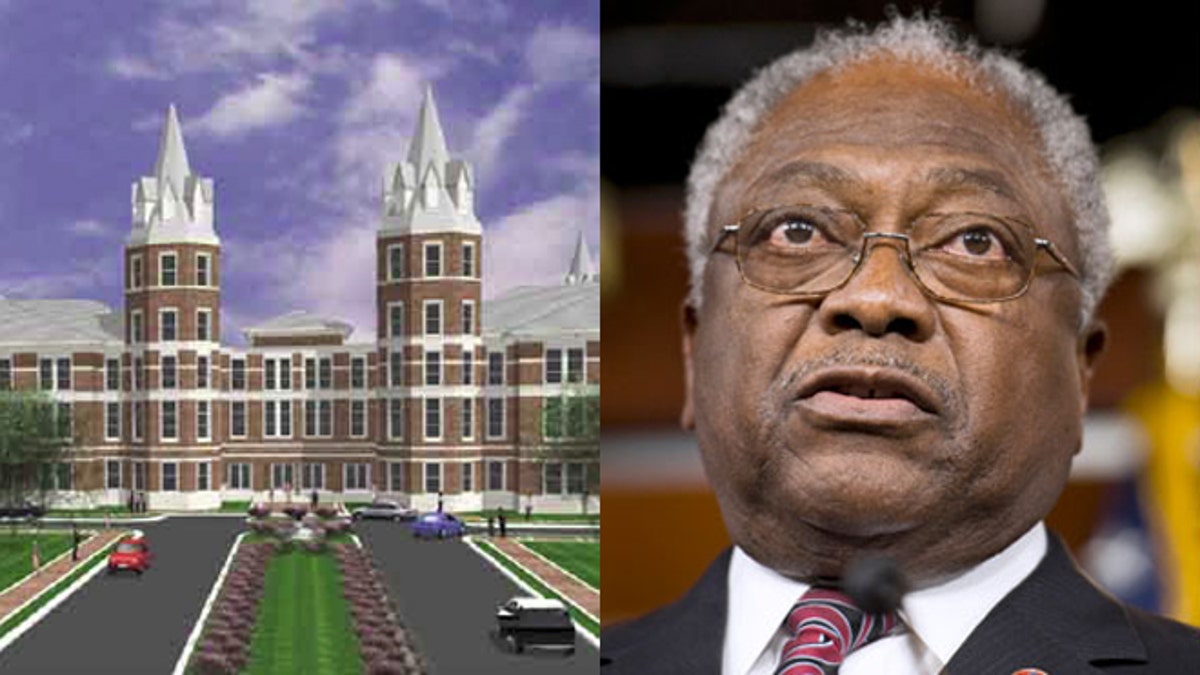
Shown here is a rendering of the James E. Clyburn University Transportation Center, left, and Rep. James Clyburn. (South Carolina Legislative Audit Council/AP)
WASHINGTON – It was billed as a state-of-the-art transportation hub that was going to give students at South Carolina State University a leg up on the competition.
The four building, 33-acre complex, named after its most famous alumnus, Rep. James Clyburn, would be a monument to the future -- where students could get hands-on experience and be a part of groundbreaking research in transportation.
Fast forward 15 years and the site once called the "project of the future" has morphed into a money-sucking pit. Aside from the $24 million in federal funding already spent on the project, an estimated $80 million more is needed to finish it. Of the four proposed buildings, only one has been constructed, and the program's core goal -- to provide educational and research opportunities to students at new high-tech facilities -- has obviously not been met.
Federal funding, as of now, has been suspended. But the school could still reapply, and the largely undeveloped site stands as an example of money that could have been saved for a rainy day -- funded by the same department that's now moving forward with serious sequester-related cuts.
Funding for the James E. Clyburn Transportation Center was earmarked by Congress, through the Department of Transportation. Now, that agency is warning that sequester cuts will lead to FAA furloughs causing snarled lines at airports across the country.
The problems facing South Carolina State University aren't new or isolated. There have been multiple projects that have been financed or earmarked with taxpayer money that have been forced to be abandoned. Millions of dollars wasted on proposals green-lighted through the federal government and now put on hold have added to the crippling fiscal problems facing the country.
In South Carolina, the almost two decades-old construction project was supposed to include 8,500 square feet of automotive research and education space, a chiller plant and workspace. There were also supposed to be research bays and other transportation work pods. But that isn't what happened.
According to Clyburn, the 2005 groundbreaking was followed by a series of bizarre and crippling problems.
Clyburn, in a statement provided by his office, said the school learned -- after the groundbreaking -- that it did not own 3 acres in the middle of the 23-acre site and that negotiations to purchase that property took 18 months. Another year was tacked on for the city of Orangeburg to deed the street involved to the university. Then the state of South Carolina ordered the university to complete a traffic impact study, which took six months to do. In 2008, the chief architect for the project was diagnosed with cancer. This was followed by a record number of permit denials and modification demands. In 2009, more than one decade after the project was given the green light by the federal government, it finally won approval of the FHA and State Engineer's Office.
But the headaches only grew, Clyburn said.
The university opened the project up for bids on Dec. 18, 2009. The lowest of the 18 bids was selected, but four of the companies filed a protest. Then the chief architect died, and the search for a new one began. While permits were being secured and staff was being hired, the university underwent its own staffing changes -- there had been three different presidents and the staff on the Clyburn transportation center had changed "four or five times" Clyburn said.
Spiraling construction costs and the loss of federal recognition for the facility brought the program to a standstill multiple times. And last year, the school was hit with a number of audits. There have also been allegations of missing money and reports of duplicate billings, questionable payments and abuses by individual employees at the center.
The school itself is facing declining enrollment numbers and a $6 million shortfall.
University spokeswoman Antia Dawkins told FoxNews.com in a written statement that the university has had to make changes in its plan to complete the center.
"The current approach is to seek the advice of a broad-based advisory board consisting of subject-matter experts in transportation," she said. "This advisory board will help us shape the focus and direction for the Transportation Initiative."
There is a possibility the amount of money the school needs to finish the project could eclipse the estimated $80 million.
"While various transportation activities have been discussed and included in our Transportation Program over the last 15 years, we cannot adequately determine the financial requirement for any plan that was discussed over that time period," Dawkins said.
Since accusations of gross mismanagement hit the school, Clyburn's enthusiasm seemed to ease a bit for the problem-plagued project. But instead of blaming the school and reported mishandling of resources, Clyburn believes the problem is a political one.
"The faculty and the school have become victims of vicious manufactured attacks by political partisans, and that is unfortunate for the university and the students who would benefit from this program," Clyburn said in a written statement to FoxNews.com Monday. "I don't know what the future of the center is, and I will leave that up to the university and its alumni to determine."




